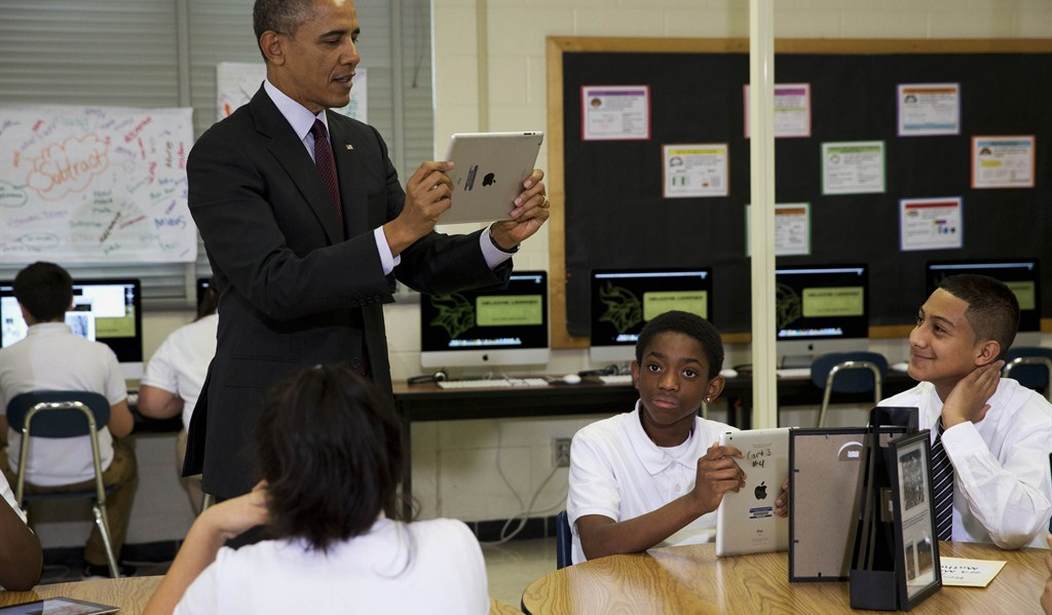If anyone expects children born in the 21st century to write checks, use postage stamps, or prefer analog watches to digital, they are destined for profound disappointment. The generation graduating college in the 2030s will lose valuable lessons that accommodate the near-extinct commodities mentioned above: money management as it pertains to future cash expenses, the joys of receiving mail that is not a bill or solicitation, and covertly directing a friend to look at the "babe at 12 o'clock." As helpful as ledgers, personal mail, and clock-face calibration may be, they pale in comparison to the gross losses Generation Alpha will suffer, starting in the classroom.
Classrooms today are outfitted with technology. From each student having their own tablet or laptop instead of notebook paper and pencils to smart boards in lieu of chalk or dry erase boards, students today have been armed to the teeth with tech they will use over the course of their education and well into the beginnings of their careers. "This is going to be their lives, so they have to know how to use these kinds of things!" people say. "There is no sense fighting the future!" others state.
I disagree with such a binary assessment. The trade-offs of a high-tech classroom are signification enough to warrant an argument for balance.
Typing Versus Writing
Students today will never have the disfigurement of a permanent callous on the middle finger of their writing hand from having to write and write and write more. Rather, their thumbs fly across phone keyboards and they peck with ease on tablets. If children learn to navigate a qwerty keyboard even before they are literate, one would think they'd be able to type without looking, right? Wrong.
Forget words per minute or accuracy drills, because children are expected to come to school knowing how to type, there is little effort put toward their correct use of the tool. As a result, taking notes, answering short-answer questions, and especially tapping out multi-paragraph essays is painfully slow.
Writing, though, is equally painful. Elementary teachers who teach handwriting do their very best with correct letter formation and pen-in-hand positioning, but those lessons are minimized to make way for gamified learning, that is, lessons that use computer games to teach. No one needs handwriting for those assignments.
Why does any of this matter? Students today have a hard time keeping up with fast-paced and active listening environments if they are expected to rely on their own skills and not a dictation device. Lectures and meetings will look much different in 2040 simply because they'll have to. Anyone who learns by writing (yours truly, included) will be hamstrung without writing or typing skills.
Moreover, digital delivery means instant gratification. The human brain processes information differently when writing versus typing, and the latter proves to require more cognitive and critical thinking skills. Not only do we remember things more clearly when we write them, but we are also forced to focus more intently on the task at hand (unintentional puns are my favorite puns). Attention deficits and short-term memory issues? Sound familiar? It should if you know a middle school student today.
Reading Versus Listening
A bibliophile can wax poetic about the smell of a book, the texture and weight of its pages, even the quality with which the spine is made. Generation Alpha would rather take the "Blackout Challenge" than sit and read a book. As a middle school English teacher, I cannot stress how real the struggle is to get students to read physical books, especially classics. They want to watch the movie, be told a basic summary, or listen to the book being read to them.
I love my audiobook subscription as much as the next person, but only for light reads. If I zone out for a minute, I can simply tune back in without any consequential losses. If I tend to lose focus as someone listening to a book for pleasure, how easily it is to do so when the topic is dense, boring, and complicated! Twelve-year-olds struggling through "The Odyssey" don't stand a chance.
Without any way of taking notes on a page, earmarking, highlighting, or underlining anything that is read to them, the exercise becomes absurd and pointless. Even in digital texts, depending on which platform is used, annotating is a chore. There is a reason mankind made and distributed books in the classroom as soon as we were able: bards and relying on oral tradition for educating a population is inefficient at best and ineffective at worst.
All things considered, most students today are spectacularly deficient in reading, writing, and cognitive thinking largely because of technology in the classroom. I have heard "do not worry about spelling" far too many times, because autocorrect is a safety net. A student told me she didn't need to know how to appropriately use a comma because "that's what Grammarly is for." Technology solutions for learning gaps are fine, until you realize the learning gaps are because of technology solutions.
If we want to raise standards and performance in schools, then we need to go back to the fundamentals of reading, writing, and disciplined focus by blending tradition with technology.










